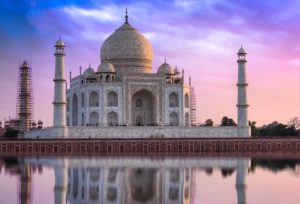India & World UpdatesHappeningsBreaking News
High Court rejects plea of BJP leader, 22 closed doors of Taj Mahal won’t be opened

May 12: Lucknow bench of Allahabad High Court rejects petition seeking to open 22 closed doors in Taj Mahal. On Thursday, while dismissing the petition, the High Court said that such debates are meant for the drawing room and not the court of law. “The issues lie outside court and should be done by various methodology and should be left with the historians,” the court said.

 The Allahabad High Court on Thursday pulled up the petitioner seeking opening of 22 rooms in the Taj Mahal, and asked him not to make “a mockery of the PIL system”. “Go and research. Do M.A. Do PhD.,” a bench comprising Justices DK Upadhyay and Subhash Vidyarthi said, according to Bar & Bench.
The Allahabad High Court on Thursday pulled up the petitioner seeking opening of 22 rooms in the Taj Mahal, and asked him not to make “a mockery of the PIL system”. “Go and research. Do M.A. Do PhD.,” a bench comprising Justices DK Upadhyay and Subhash Vidyarthi said, according to Bar & Bench.
On Saturday, a writ petition has been filed in the Lucknow bench of the Allahabad High Court seeking directives to the Archaeological Survey of India (ASI) to open 20 rooms inside the Taj Mahal in Agra to ascertain whether the Hindu idols and inscriptions are hidden there.
 Infact, the plea has been filed by Bharatiya Janata Party (BJP) media in-charge of Ayodhya district, Dr Rajneesh Singh, who will be represented by advocate Rudra Vikram Singh in court once the matter gets listed in the court for hearing. In the plea, the petitioner has sought directives from the court to the state government to constitute a committee that would examine these rooms and look for any evidence related with the Hindu idols or scriptures there.
Infact, the plea has been filed by Bharatiya Janata Party (BJP) media in-charge of Ayodhya district, Dr Rajneesh Singh, who will be represented by advocate Rudra Vikram Singh in court once the matter gets listed in the court for hearing. In the plea, the petitioner has sought directives from the court to the state government to constitute a committee that would examine these rooms and look for any evidence related with the Hindu idols or scriptures there.
 Rajneesh Singh said, “I have filed a petition in the high court seeking directives to ASI to open these rooms to ascertain facts. There is no harm in opening these rooms and setting to rest all controversies.” In the plea, the petitioner has sought directives from the court to the state government to constitute a committee that would examine these rooms and look for any evidence related with the Hindu idols or scriptures there.
Rajneesh Singh said, “I have filed a petition in the high court seeking directives to ASI to open these rooms to ascertain facts. There is no harm in opening these rooms and setting to rest all controversies.” In the plea, the petitioner has sought directives from the court to the state government to constitute a committee that would examine these rooms and look for any evidence related with the Hindu idols or scriptures there.
 It may be pointed out that several right-wing organisations claim Taj Mahal to be Tejo Mahalaya, a Hindu temple. Such claims have been put to rest not just by historians but also by the Archaeological Survey of India which has time and again refuted such revisionist interpretations of Taj Mahal’s history and dismissed claims to ownership. It’s now for the public to wait and watch what the High Court decides in this matter.
It may be pointed out that several right-wing organisations claim Taj Mahal to be Tejo Mahalaya, a Hindu temple. Such claims have been put to rest not just by historians but also by the Archaeological Survey of India which has time and again refuted such revisionist interpretations of Taj Mahal’s history and dismissed claims to ownership. It’s now for the public to wait and watch what the High Court decides in this matter.




